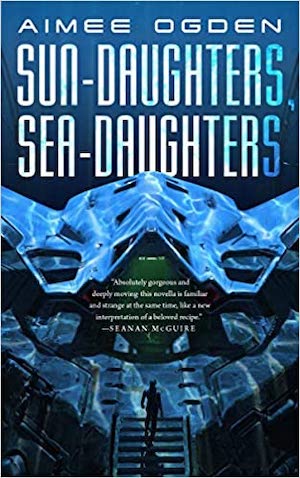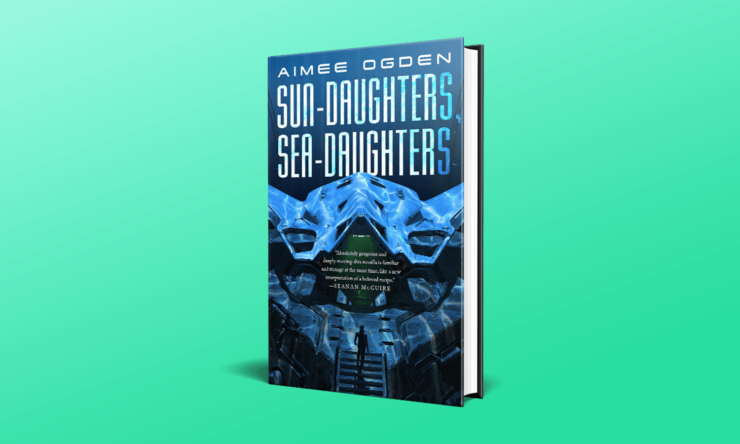It’s not always easy to figure out what to say about a novella. Especially a slender one. A novel has—usually—plenty of subplots to provide meat for discussion, multiple characters and strands. A novella is much less meandering, much more focused: it has much less space in which to satisfy (or infuriate) a reader, and consequently there is often less for a critic to discuss.
Sun-Daughters, Sea-Daughters, Ogden’s first outing with Tordotcom Publishing, clocks in at a slim 106 pages in its paper version. In its science-fictional milieu, humans—modified, genetically and otherwise, to adapt to their environment—have spread across the stars. Some of the environments are quite severe. Some of the human populations are lower tech than others. Some have more or less traffic with other groups.
Atuale came from one of the sea clans on a less-trafficked world. The child of a seaclan lord, when she abandoned the sea for a land-bound lover, it caused a war under the sea. Her change to a form that would let her persist on the land was facilitated by a former lover from her youth, a black-marketeer with a gift for technology known as the World-Witch. Now, years later, Atuale’s spouse and his landbound people are dying of a plague that none of them can cure. Atuale knows the only hope for a cure lies with the World-Witch, and travel off-world. But the Witch has changed since their shared youth, and between old griefs and betrayals, fresh differences and loyalties, as much separates as connects them. And even with the Witch to aid her—and to make her uncomfortable, discommoded, torn between her desires—Atuale will run into the problem of possibly carrying the plague with her. Will anyone help her in time, if it means risking their lives to contagion?
Buy the Book


Sun-Daughters, Sea-Daughters
A novella involving a plague, in a plague-year that we’re still not out of: it’s a bit of a hard sell to me, to be honest. (And my sympathy for Atuale reached an all-time low when some of her decisions put large numbers of other people at potential risk of contagion.) And yet. Ogden’s prose is graceful, elegant: smooth and at times poetic without being obtrusively overdone. So too the worldbuilding. It has a depth and vividness that many longer works lack, and uses its silences and absences as much as what it says outright to evoke both a complex set of societies and its characters’ relationships with those societies.
Silences and absences, things unsaid or said slantwise, characterises the interplay between Atuale and the Witch, as well. There’s a push-pull of desire between them, of roads not taken and choices to be made, and mutual (mis)understandings. This isn’t a romance, so much as it’s a roadtrip of reconnection and farewell. Atuale has chosen her husband, and will chose him again, despite any distance that might lie between them, a choice made now after seeing other possibilities. Despite the cost. But it’s not an inevitable choice. Just as Atuale once chose the land over the sea, she will chose the land over the stars, too—but the stars are very tempting.
Sun-Daughters, Sea-Daughters is not a re-imagining of The Little Mermaid, though one sees clear lines of influence. What Atuale gives up is less tangible than a voice, but in some ways no less cherished. It’s an odd, compelling little novella. Also it plays imaginatively with biology and gender, which is cool. I’m glad I read it.
Sun-Daughters, Sea-Daughters is available from Tordotcom Publishing.
Read an excerpt here.
Liz Bourke is a cranky queer person who reads books. She holds a Ph.D in Classics from Trinity College, Dublin. Her first book, Sleeping With Monsters, a collection of reviews and criticism, was published in 2017 by Aqueduct Press. It was a finalist for the 2018 Locus Awards and was nominated for a 2018 Hugo Award in Best Related Work. She was a finalist for the inaugural 2020 Ignyte Critic Award, and has also been a finalist for the BSFA nonfiction award. Find her on Twitter. She supports the work of the Irish Refugee Council, the Transgender Equality Network Ireland, and the Abortion Rights Campaign.










